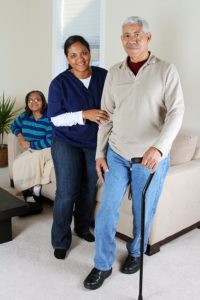Senior Care-Caring for your Parent after Hip Replacement Surgery
August 10, 2017

One of the main concerns a person undergoing hip replacement surgery has is how will they cope after the surgery. Will they be able to take care of themselves? Perform the everyday activities of living? Knowing that you, as a family caregiver, will be there to support them following the days after surgery will go a long way in easing their fears and promoting their healing.
Needing Help…
After hip surgery, a person will often need help in the following ways:
Normally they will be using a walker until they graduate to a cane and, eventually, to not needing any mobility support. It’s important at this time that their home is kept open and pathways cleared in order to avoid tripping and serious injury. To this end, clear clutter, remove throw rugs, make sure their home has good lighting and consider installing motion sensors or night lights. They will probably need a toilet seat raiser as well as risers for the most commonly used chairs. A grab bar in the shower and by the toilet is a good idea. If their bed is upstairs, you will need to rent a portable bed and place it downstairs until they are able to navigate stairs once again.
Physical therapy will be required to make sure that they have the best recovery possible. You will need to provide transportation or get a caregiving team together and schedule someone else to provide transportation.
Your parent will need help with the everyday activities of living for up to several weeks. There are certain movements that they should not perform such as bending, crossing their legs, or twisting from side-to-side.
Complications: As a family caregiver, it’s important to be aware of the complications that can occur. One such complication is a blood clot. Keep an eye out for swelling in the leg, or tenderness in the calf, knee or groin. Compression stockings may be recommended to help prevent this dangerous occurrence. If you see telltale signs, take your parent to the emergency room immediately.
Another possible complication is a dislocation of the hip joint. Signs include severe pain and the inability to walk or move the leg.
Pain: Helping your parent manage pain will be a critical component to caregiving immediately after surgery and possibly for several weeks. Follow their physician’s recommendations closely regarding dose and time of pain medication. Ask their primary care provider about applying ice packs for 20 minutes every hour or so. Help your parent change positions when lying, sitting up and standing, and make sure they do not stay in the same position for long periods of time.
Senior Care Provider: With time, your parent will get better. Many do report wishing they had undergone the surgery sooner or wonder when they can get their other hip replaced. In the meantime, a senior care provider can help provide the care they need during those first critical few weeks after returning home. You and your parent may find their support and care so beneficial that they become a critical part of your parent’s long-term caregiving team.
If you are considering elder care in Squirrel Hill, PA, please contact the friendly staff at Liken Home Care.
Call (412) 693-6820 or (855) 856-0551
Resources:
Post Operative Care